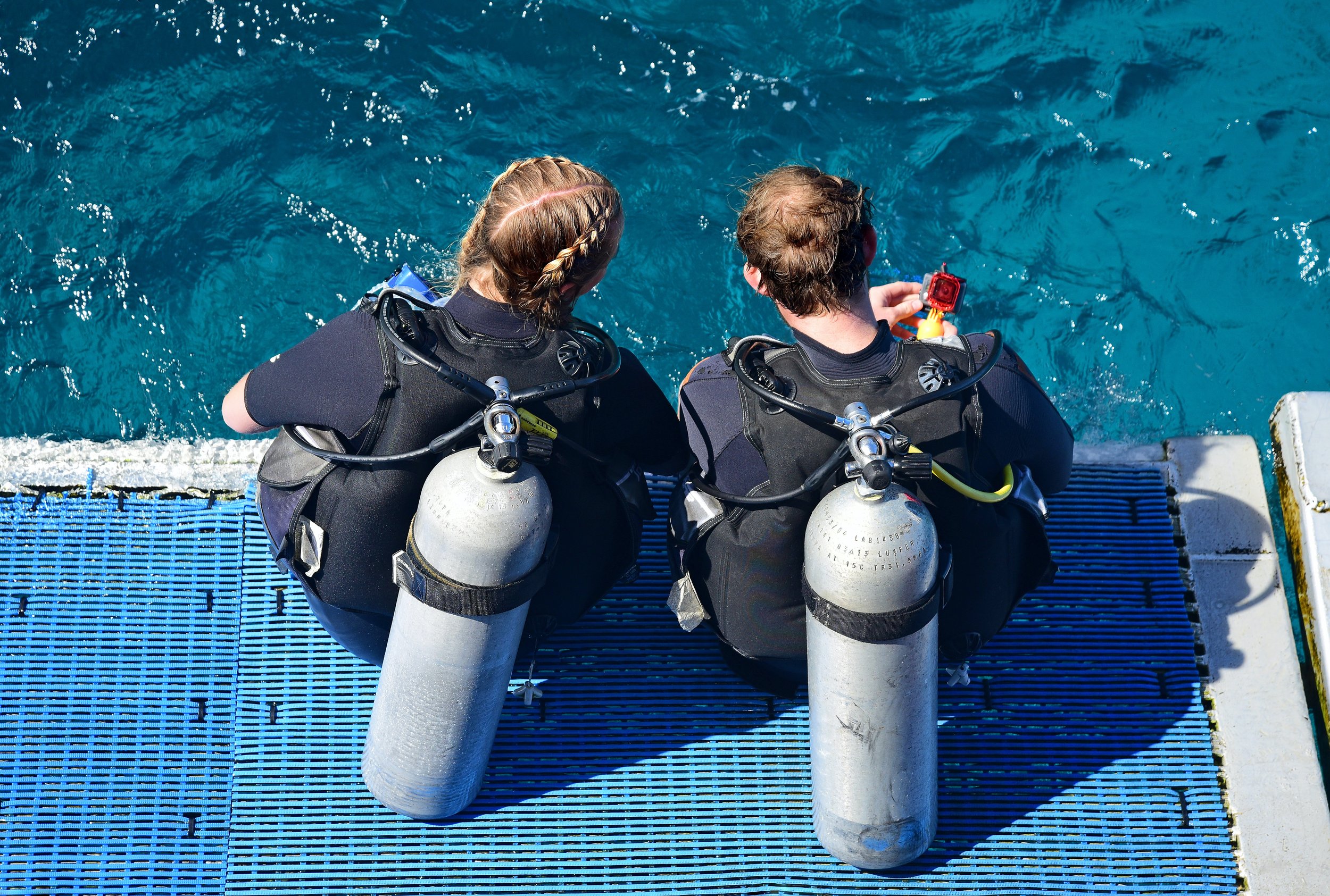What project controls and scuba diving have in common
When Manny and Pamela Abela aren’t busy working alongside the broader MRC team and partnering with clients, you can often find them in a tropical location enjoying one of their favorite hobbies: scuba diving. The pair have been training and doing dives for years and are avid underwater photographers. Their scuba experience is even what led to Manta Ray Consulting’s name. While scuba diving may seem worlds away from the desk of a project controls analyst, the two aren’t that different in many aspects. Manny and Pamela’s underwater expertise has informed the way MRC approaches training and mentorship at the consultancy. Here they share how project controls and scuba mirror each other in three key areas: training, preparing for a new project, and ongoing project controls work.
Training – making mistakes in a “controlled environment”
Project controls and scuba diving require a certain level of know how to embark on either. This might look quite different in each arena – scuba does require a certification, where project controls does not – but the premises are actually quite similar. In both, you learn to mitigate risk in your field and do so by working with a mentor.
“In scuba your initial three-to-five-day training is just the basics, and you then need to spend time following an experienced diver,” Pamela says. “The same is true in project controls; learning the tool is just learning the tool. Mentors can help you experience the real-world applications.”
Understanding how the tools you use work in the real world is critical in both situations. In scuba, mistakes can be fatal; thankfully, project controls doesn’t have a life or death component, but mistakes can lead to loss of funding or major projects issues. Manny and Pamela helped guide the development of MRC’s mentorship training approach by learning from their scuba knowledge. By mirroring initial dives with an experienced scuba diver, MRC’s team members learn the ropes in a controlled environment with someone alongside them the whole time.
“We let our team make mistakes in a controlled environment,” Manny explains. “Like scuba, we make sure you can’t get into a whole lot of trouble at first and have someone guiding you as you grow and learn.”
Once past the training phase, MRC’s approach pulls from scuba to inform the project preparation phase as well.
Preparing – using the buddy system
One of the most important things you’ll learn in scuba training is the “buddy check.” It’s critical that you always dive with a partner you will rely on in multiple ways (unless you’ve got plenty of experience under your belt for solo diving). When diving, each partner checks their own and their partner’s gear before donning the equipment. At MRC the mentor relationship works in much the same way.
“When we have a new analyst starting a project, we also go through check to make sure the person is ready,” Manny says. “The mentor goes through the checklist alongside them and decisions about an analyst’s readiness are made between the two.”
Part of preparing for a new project is anticipating and planning for certain risks both known and unknown. Manny and Pamela do this underwater by implementing the next phase of the buddy system. If you suddenly get separated from your diving partner, you take exactly one minute to search, then begin the process of resurfacing if you do not find them. With both partners following this procedure, you’ll find each other quickly at the surface or immediately be aware of a bigger problem. In project controls, this can apply to working with a mentor or your team at large. If something seems off, the individual analyst can take a moment to see if they can solve it; otherwise, it’s time to “resurface” and re-evaluate with your project team.
“In many instances a crisis in project controls arises from personality conflicts,” Manny explains. “When this is happening, an analyst on our team will often request my help by ‘meeting me at the surface’ to explore what’s going on.”
Pamela adds on to this concept by pointing out that risk management in both realms is better described as risk mitigation.
“There’s always a mitigation plan for the dive and for the project,” she says. “When something catastrophic happens, our team knows to stop, look for your buddy, and meet to decide what we do next.”
Growing in the field – the benefit of repeatable processes
That attitude of preparedness and risk mitigation carries into both ongoing project work and scuba dives even once you’re experienced. A key part is being ready to acknowledge your own gaps, when you’re not ready to begin, and when your original plan no longer works. Both scuba and project controls require a certain level of nimbleness and humbleness.
“In scuba, we ensure that we are prepared, and our bodies are prepared,” Pamela says. “This includes admitting if we feel sick and not getting in the water for a planned dive if that’s the case.”
In project controls this often looks like advocating for yourself and your team and calling out which risks are simply unacceptable. Sometimes, this means deviating from your original plan.
“You have to be humble enough to say your original idea is no longer a good one, and you need to do that before it’s too late,” Manny says. “Deviating when needed can save bigger issues from happening.”
Project controls analysts can also learn from scuba in remembering that even if you’re experienced and confident there’s no need to reinvent the wheel, the Abelas say. There’s no need to overcomplicate things and streamlined, repeatable processes are an asset. In scuba and earned value management being able to replicate a successful process each and every time can make or break a scenario.
“Having a process you’ve created that only you know how to do makes you a single point of failure,” Pamela says. “This goes right back to the buddy system.”
The Abelas have found major benefit in intertwining what they’ve learned in both the world of scuba diving and the field of project controls. In addition to being continuous learners in both areas, the Abelas can share advice with colleagues in each.
“Planning and executing correctly in both worlds creates a very rewarding experience,” Manny says. “You’ll want to dive right back into both once you’ve seen what they can be.”



